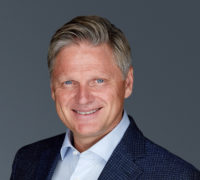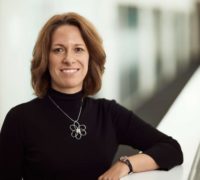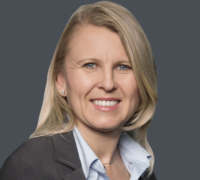AI regulation: Turning compliance into competitive advantage
How navigating regulatory changes around AI can not only safeguard your organization against emerging threats but also foster ethical and sustainable innovation ...
YouTube
26 October 2021 • by Julia Binder, Knut Haanaes, Anette Mikes, Natalia Olynec, Peter Tufano in Sustainability
Professors from IMD and Oxford Saïd Business School explore the opportunities and risks presented to executives as they transform their businesses on the road to decarbonization....
Business needs to play a leading role in tackling climate change and the most successful companies will be those which reframe the emergency as a positive catalyst for new, innovative business models, said experts from IMD and Oxford Saïd Business School.
The professors were speaking as part of a joint webinar on Climate Change, Business Transformation and Risk Management – the fourth in a series hosted by Business Schools for Climate Leadership, a new collaboration between eight leading European business schools – to help shape climate leadership.
“Companies that deal proactively with climate perform better,” said Knut Haanaes, IMD Professor of Strategy and Lundin Chair Professor of Sustainability during the event which was moderated by Peter Tufano, Peter Moores Professor of Finance at Saïd Business School
On the one hand there are around 1.3 million start-ups looking to disrupt traditional business models with new technologies, but established companies that can quickly scale new solutions will also play a role, said Haanaes.
The stakes are high. Business will be responsible for up to 70% of the reduction in carbon emissions needed if the world if the world is to limit global warning to 1.5 degrees Celsius, in line with the Paris Agreement, with action by consumers only able to account for 30%.
Some 500,000 companies within the European Union will need to be transformed involving business leadership where we also collaborate with multiple stakeholders and other companies, , said Haanaes.
“We are seeing many businesses move from talk to real action,” said Natalia Olynec, Head of Sustainability at IMD. “These companies don’t have all the answers, but they are asking some bold questions in order to scale their impact,”
For example, Maersk, the world’s biggest shipping company has stated its ambition to decarbonize shipping and in August placed an order for eight large vessels that will be running on zero carbon fuels. Dutch nutrition company Royal DSM is supporting the shift from intensive farming methods to regenerative agriculture by reducing the environmental footprint of the dairy industry by introducing innovative animal feed. And food giant Nestle wants to make all their packaging recyclable or reusable after noticing a substantial shift in consumer preferences towards sustainable products.
No one company can solve it alone, we need the partnerships and the different players to play along- Knut Haanae
Business leaders should ask themselves three questions on the road to decarbonization as they think about new business models, says Haanaes.
“No one company can solve it alone, we need the partnerships and the different players to play along,” said Haanaes, describing the climate crisis as the “ultimate leadership challenge of our time.”
Companies have been slow off the mark, says Anette Mikes, Associate Professor of Accounting at Oxford Saïd Business School, describing the period between 2006 and 2016 as a “lost decade” when around $1 trillion per year in investment was still funnelled into fossil fuels.
In 2021, there is mounting pressure on governments to act, creating the chance for a “watershed decade” if we manage to transition towards a greener energy future, she added.
To do this, companies will need to step outside their comfort zone and liaise with lobby groups and other actors like governments, regulators, and the EU to create the policy framework to respond to the climate change challenge.
Risk managers are now faced with challenges on an unprecedented scale and never-seen-before events.
On the one hand, they are faced with physical risk, such as the extreme weather events that can wreak havoc on their assets, supply chains, employees, consumers and communities. At the same time companies are having to contend with transition risk and the threat of becoming irrelevant because they fail to keep up with changing times, said Mikes.
With extreme weather events becoming more frequent and unpredictable we are also seeing so-called tsunami risks such as last summer’s devastating floods in Germany. Moreover, we are likely to face perfect storms where droughts lead to rising food prices, social unrest and forced migrations. Finally, business needs to be braced for so-called Black Swan events that cannot be predicted but which threaten to overwhelm our control capabilities.
It is important to recognise that companies have different starting points. Some may be more dependent on fossil fuels, while others will have different abilities to pass on the costs of the transition to customers, said Mikes. There are also big differences in the availability of low carbon technologies across sectors with utilities faced with lower cost alternatives than say the steel industry.
One thing is certain that defensive strategies are no longer tenable, said Mikes, with companies now preferring to be at the forefront of the green transition. Some will segment their businesses and charge a premium for green products. For companies without readily accessible technologies, engagement with policymakers will be key.
One such example is steelmaker ArcelorMittal which has pledged to invest 1 billion euros in decarbonisation technologies at it plant in Spain and will install a 2.3 million tonne direct reduced iron (DRI) unit complemented by a 1.1 million-tonne hybrid electric arc furnace (EAF) before the end of 2025.
Cooperation is needed on all sorts of levels and we don’t need to compete on sustainability, we don’t need to compete when it’s about saving the planet- Julia Binder
Julia Binder, Professor of Sustainable Innovation at IMD also believes companies need to shift their mindset to think like entrepreneurs who reframe problems into opportunities. They also need to stop viewing others as a threat.
“Cooperation is needed on all sorts of levels and we don’t need to compete on sustainability, we don’t need to compete when it’s about saving the planet,” said Binder.
Research shows that companies that formulated pollution risk as an opportunity were much more innovative than those fighting them with defensive strategies, added Mikes.
The professors also acknowledge the hurdles facing firms, not least the lack of a transparent and standardised way of measuring emissions across the value chain.
From a policy perspective, governments can help hasten the transition by providing both sticks and carrots, such as incentivizing companies to shift away from fossil fuels towards clean energy, said Mikes.
With 60% of S&P 500 companies facing major, stranded assets, there are clear economic incentives to take action said Haanaes. But increasingly employees are pushing for change. “Leaders of the future already have a different mindset” he said, adding that many businesses today thrive on working in sync with the planet’s resources, rather than only drawing from them.
The challenge will be ensuring that executives are armed with the questions and skills to bridge competitive boundaries and work across sectors to address the climate emergency.
“With climate comes a new job but also a purpose for business schools,” said Haanaes.

Professor of Sustainable innovation and Business Transformation at IMD
Julia Binder, Professor of Sustainable Innovation and Business Transformation, is a renowned thought leader recognized on the 2022 Thinkers50 Radar list for her work at the intersection of sustainability and innovation. As Director of IMD’s Center for Sustainable and Inclusive Business, Binder is dedicated to leveraging IMD’s diverse expertise on sustainability topics to guide business leaders in discovering innovative solutions to contemporary challenges. At IMD, Binder serves as Program Director for Creating Value in the Circular Economy and teaches in key open programs including the Advanced Management Program (AMP), Transition to Business Leadership (TBL), TransformTech (TT), and Leading Sustainable Business Transformation (LSBT). She is involved in the school’s EMBA and MBA programs, and contributes to IMD’s custom programs, crafting transformative learning journeys for clients globally.

Lundin Chair Professor of Sustainability at IMD
Knut Haanaes is a former Dean of the Global Leadership Institute at the World Economic Forum. He was previously a Senior Partner at the Boston Consulting Group and founded their first sustainability practice. At IMD he teaches in many of the key programs, including the MBA, and is Co-Director of the Leading Sustainable Business Transformation program (LSBT) and the Driving Sustainability from the Boardroom (DSB) program. His research interests are related to strategy, digital transformation, and sustainability.

Associate Professor of Accounting at Oxford Saïd
Anette Mikes is an Associate Professor of Accounting at Oxford Saïd Business School and a Fellow at Hertford College. In 2017, she was honored with the ACA Prize in Financial Governance of the Institute of Accounting, Control and Audit of the University of St. Gallen for her contributions to the field of risk management and financial governance.

Chief Sustainability Officer at IMD
Natalia is the Chief Sustainability Officer at IMD. She designs and implements sustainability strategy, develops executive education programs and advisory, publishes research, builds cross-sector partnerships, and communicates IMD’s ambitions and progress. The Center for Sustainable and Inclusive Business, co-led by Olynec, aims to support leaders and companies to take steps towards a more sustainable and inclusive business world by harnessing IMD’s knowledge and expertise in the area and offering tools to help them deliver systemic, innovative, and impactful responses.

Professor of Finance at Saïd Business School
Peter Tufano is the Peter Moores Professor of Finance at Saïd Business School, a Professorial Fellow at Balliol College, University of Oxford, and an Honorary Fellow at St. Benet’s Hall at Oxford. From 2011-2021 he served as the Peter Moores Dean of the School.
12 April 2024 • by Öykü Işık in Videos • 7 min read
How navigating regulatory changes around AI can not only safeguard your organization against emerging threats but also foster ethical and sustainable innovation ...
2 April 2024 • by Marleen Dieleman in Videos • 8 min read
Fourth-generation family members Dato’ Yong Yoon Li, the Managing Director, and Chen Tien Yue, the Executive Director, explain how drafting a ‘family charter’ and creating opportunities for social bonding has helped Royal...
29 March 2024 • by Heather Cairns-Lee in Videos • 7 min read
By changing our perspective from, ‘Someone should do something about this to ‘I’m going to do something about this’, we can all be activist leaders, Lucy Parker – co-author of The Activist...
26 March 2024 in Videos • 9 min read • 
A year into the job, Marco Arcelli, CEO of ACWA Power, tells IMD President Jean-François Manzoni how the Saudi company plans to triple assets to $250 billion in six years by expanding...
15 March 2024 • by Jennifer Jordan in Videos • 6 min read
Balancing authenticity with workplace demands poses a challenge for leaders striving for integrity. How can leaders reconcile their true selves with organizational expectations? ...
8 March 2024 • by Öykü Işık, Sarah E. Toms, Josefine van Zanten in Videos • 8 min read
Through the lenses of global corporations, small businesses, and academia, we delve into the progress made by integrating more women into these sectors – and identify areas needing further improvement....
27 February 2024 in Videos • 9 min read • 
Henkel CEO Carsten Knobel tells IMD President Jean-François Manzoni why he has remained laser focused on implementing its purposeful growth agenda and why the company decided to exit Russia. ...
19 February 2024 • by Tania Lennon in Videos • 9 min read
New approaches to modeling executive performance can help identify leaders with the skills to build future-ready businesses. ...
12 February 2024 • by Tania Lennon in Videos • 8 min read
The theme of strategic thinking – and which factors drive sustained success in very volatile environments – comes up time and again in business leadership. But what exactly is strategic thinking? And...
29 January 2024 • by Katharina Lange in Videos • 9 min read
A new book by Dovev Lavie, Professor at the Department of Management and Technology of Bocconi University, sets out an extraordinary plan to tackle urgent social problems of inequality, wealth concentration, loss...
Explore first person business intelligence from top minds curated for a global executive audience